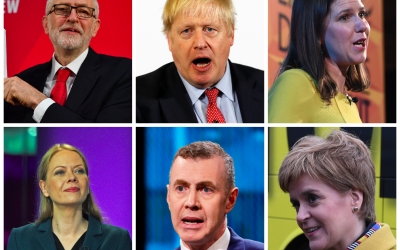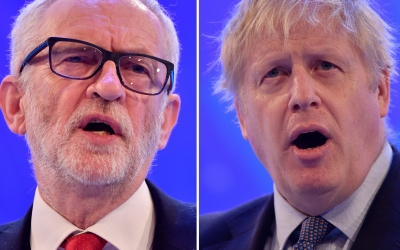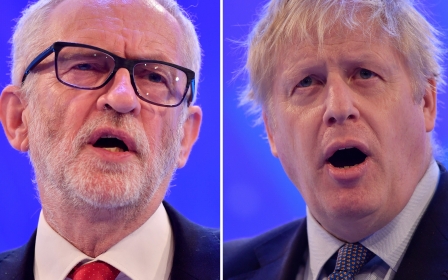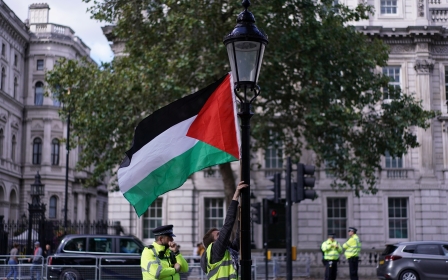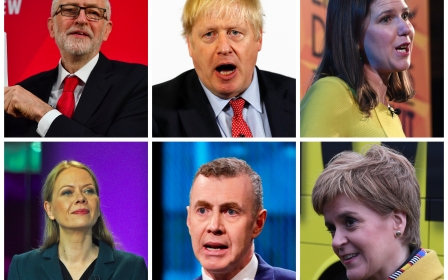The Conservatives are weaponising ethnic fear to beat Corbyn's Labour
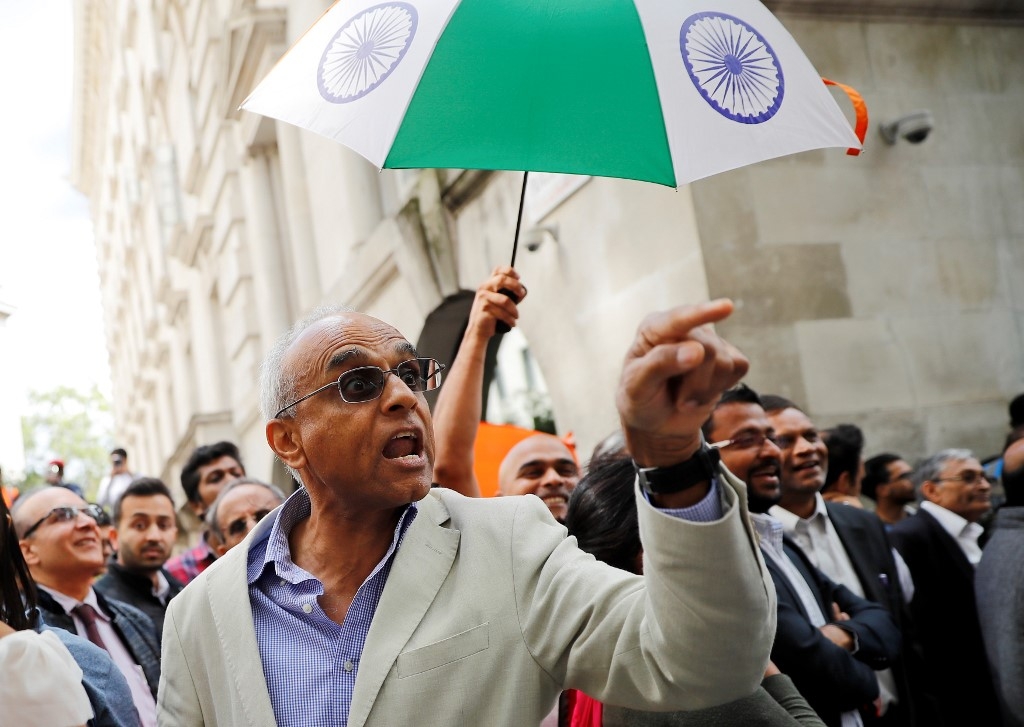
You don’t expect Kashmir to be the number one concern of voters in Chipping Barnet, but on a recent weekend trip the besieged region comes up three times on the doorstep in less than an hour.
British Indian voters in this suburb of North London have taken against Jeremy Corbyn, after the Labour leader tweeted that “human rights abuses” taking place in Kashmir are “unacceptable”, and after his party initially branded the situation a “major humanitarian crisis”.
The Conservative Party jumped into the fray, pushing out messages to Hindu voters that claimed Labour was “against India”. In an interview with India Today, Boris Johnson spoke about “anti-India forces operating in the UK”, a line that was fully endorsed by the Indian publication. Much of the rest of the subcontinent's press has followed suit.
In Chipping Barnet, supporters of Indian Prime Minister Narendra Modi conflated the Indian nation with the prime minister and his party, the BJP.
'He's anti-India'
New MEE newsletter: Jerusalem Dispatch
Sign up to get the latest insights and analysis on Israel-Palestine, alongside Turkey Unpacked and other MEE newsletters
“He’s anti India”, one said of Corbyn, repeating a Conservative attack line. “He lets the Muslims do what they want,” said another, channelling the Hindu nationalism of the BJP and Modi, the man known as the “Butcher of Gujarat” for his failure to stop the mass killing of Muslims in the state when he was governor.
This is an election in which Britain, once again, has turned in on itself
This is an election in which Britain, once again, has turned in on itself. But that doesn’t mean the world at large isn’t there and it doesn’t stop a national contest also being one that is fought locally across hundreds of neighbourhoods, with the feelings and priorities of voters sometimes surprising to those trying to sway them.
Foreign policy is more or less absent from the debate. This was the case before the 2016 EU referendum but is far more so now.
The United Kingdom has been stuck in purgatory for more than three years and the Conservative Party hammers the point constantly, saying it will “Get Brexit Done”, failing to mention the years of trade negotiations that will follow or the fact that it was a Conservative government that called the referendum, then failed to strike any kind of plausible deal with the EU.
Labour's volunteer army
The polls don’t look particularly good for Labour but unprecedented numbers of people have hit the streets to canvass for them.
If the party can pull off a shock, it will be a testament to the power of face-to-face campaigning over an overwhelmingly hostile media, which has mounted a years-long campaign against Jeremy Corbyn, portraying him as a dangerous Marxist and an antisemite.
An affinity with Britain’s Muslims is thought to be proof of antisemitism and proof of an anti-Indian bias
Again and again, Corbyn’s past and his character come up on the doorstep. This is where the outside world intrudes once more and is where foreign policy has actually come to play a part in the election.
For some of those British Indian voters in North London, Kashmir is not the only issue. One man in his fifties mentions antisemitism in the same breath as the Labour leader’s perceived support for Muslim “terrorists”.
An affinity with Britain’s Muslims is thought to be proof of antisemitism and proof of an anti-Indian bias. At one point, another Indian man slams Britain – not without reason – for creating the problems in Kashmir in the first place, a point that Corbyn would no doubt agree with.
Recognising the impact of the "anti-India" line, Labour politician and Corbyn ally Shami Chakrabati wrote an article titled, "British Hindus voting for Labour are not 'traitors' to India".
Far right memes
These talking points don’t come from nowhere. Even Katie Hopkins, once the British tabloid media’s favourite racist, has made herself a star in Hindu nationalist circles in India, treated reverently by Indian journalists because she baits Muslims over Kashmir.
When not having her photo taken next to far-right leaders such as Geert Wilders of the Netherlands, Hopkins has been interviewed on Indian television discussing how Muslims are threatening free speech in Britain.
Across right-wing Facebook groups clogged with disinformation, many of them Brexit-orientated, the Labour leader is smeared for meetings he has held with members of Hamas and Hezbollah, derided as a friend of terrorists and hatemongers. A picture shows Corbyn with a group of Muslim women. The caption reads: “Mr Anti Semitic Corbyn”.
In the murkier regions of this online world, memes circulate of Corbyn and Shamima Begum, the British woman who joined the Islamic State (IS) group in Syria and whose three children died in a camp, portraying Corbyn as an IS facilitator. In another meme, Corbyn is shown holding a newspaper called “ISIS Daily”. The caption reads: "Jihadi Jeremy, For The Terrorist, Not the Brit, Or the Jew”.
Britain First
These pieces of propaganda – and there are many of them – rely not just on lies, but on a deeply entrenched view of Britain’s place in the world that still exists in significant parts of the population.
Antisemitism has been turned into a toxic political talking point, used by Corbyn’s opponents to instil fear in Jewish and non-Jewish voters alike
In this view, Britain is a strong and proud force for good in the world, not an imperial interloper. It is opposed to what is presented as Islamist terrorism but which in actual fact is simply any Muslim.
Its defence of Israel is trumpeted as a defence of Jewish people but this is nothing but opportunism – the conception of Britain here is white and Christian. The Brexit-loving voters frequenting these pages are no friends to the Jewish people.
But the constant claim that Labour under Corbyn is antisemitic is one that the Conservative Party and much of the media has used not just to alienate Jewish voters, many of whom feel understandably under siege and under threat, but also to turn the population at large against an opposition leader associated with the crankier regions of the left.
And so Labour’s failure to deal with the issue of antisemitism quickly and sensitively is turned into something worse than Boris Johnson and the Conservative Party’s long and recorded history of racism – both systematic and personal. Antisemitism has been turned into a toxic political talking point, used by Corbyn’s opponents to instil fear in Jewish and non-Jewish voters alike.
In the patriotic anti-leftist world view, one that can be found among working class and upper class white Britons alike, a man like Jeremy Corbyn is an aberration.
He has spent his life campaigning against racism. He has met with a host of non-white political actors whose characters and motivations are thought to be deeply anti-British. He believes that the true nature of the British Empire should be taught in schools. He has a history of republicanism. He is branded as a traitor for not bowing down before the symbols of this country's nationalism.
This image of Corbyn is kept at the forefront of many voters’ minds by a double-pronged Conservative strategy that sees messages put out in the largely compliant, right-wing press that are then twisted and darkened across social media sites.
Official Conservative Party material is starkly unreliable: one campaign group found that 88 percent of Tory adverts featured claims that were not correct or not entirely correct. By contrast, it found that Labour had put out no misleading ads.
And so the public discourse is poisoned and voters are encouraged to care more about patriotic symbols – one front page story concerned whether or not Corbyn watched the Queen’s annual Christmas speech on television – than their own material lives.
Mass poverty
All this at a time when over four million children live in poverty, when the National Health Service is on its knees, when 60p in every pound given to local government by central government has been cut since 2010, and when the United Nations has called poverty in the UK “systematic” and “tragic”.
This relentless focus on a manufactured image of British greatness of course has its ramifications in the Middle East. It means a Conservative government that supports Saudi Arabia’s war in Yemen. A Conservative government that intends to ban Israel boycotting campaigns. A Conservative government that has welcomed the regime of Abdel Fattah el-Sisi in Egypt and which has, as foreign office officials have told me in the past, put Britain’s economic interests far ahead of any social or moral concerns.
It means a Conservative government tied ever closer to Donald Trump’s America and its disastrous policy in Palestine and Israel.
Against this we have a Labour leader who is determined to put justice and democracy at the centre of his government’s approach to the world.
Labour’s manifesto would mean decisive action in Palestine, Israel, Saudi Arabia and Egypt, among other places. It is no wonder that so many people across the region are so interested in this British election and are so invested in a victory for Labour.
Here is a British leader, too, who has actually spent significant periods of time in the Middle East and North Africa. The first time I encountered him, when he was still a backbencher miles from the centre of power in his party, it was as a committed champion of the people of Western Sahara. I know, because I have received messages that in the refugee camps of Tindouf they will be praying for a Labour victory.
Clear choice
With voters going to the polls on Thursday, Britain has a clear choice to make. The world now is one inextricably connected. Cooperation on the big issues of the day, from the climate crisis to tax havens, must be at the global level.
Brexit has seen Britain retreat even further into its imperial fantasy, fuelled by racism and unable to let go of a past it believes was ever glorious. While it does this, people suffer, not just at home but abroad too.
In Chipping Barnet, an Indian man who had noted Labour’s stance on Kashmir and spoke with some distaste of his Muslim neighbours, nevertheless felt sickened by what he had seen from the Conservative Party. He was taking some time to think about things, he said. He was, he knew, desperately badly served by this country's press.
It is on such thinking that this election could turn. Britain's role in the world will either be to further retreat and play second fiddle to Donald Trump's United States, becoming a country in which the rich grow ever richer and the poor ever poorer. It has been going this way for a while.
Or the British public could chose a party that will reinvest in its public services, reclaim the public sphere and champion climate action and social justice across the globe.
These islands on the edge of Europe have been sent ever further into dark waters. That doesn’t mean there’s no way back.
The views expressed in this article belong to the author and do not necessarily reflect the editorial policy of Middle East Eye.
Middle East Eye delivers independent and unrivalled coverage and analysis of the Middle East, North Africa and beyond. To learn more about republishing this content and the associated fees, please fill out this form. More about MEE can be found here.



